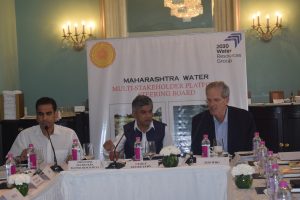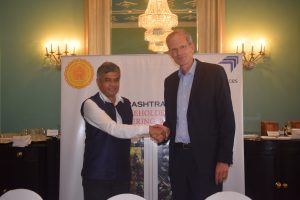Government of Maharashtra Partners with 2030WRG to Launch the State’s First ‘Multi-Stakeholder Platform’ for Transformative Solutions in Water Resources Management
 Mumbai, Wednesday, August 7, 2017: The Government of Maharashtra (GOM) and 2030 Water Resources Group (2030 WRG), in a pioneering move launched the Maharashtra Water Resources ‘Multi-Stakeholder Platform’ (Maharashtra Water – MSP) in Mumbai today, to address critical water resources challenges in Maharashtra. The Maharashtra Water – MSP, chaired by the Chief Secretary GOM, Sumit Mullick, brings together key decision makers from the public sector, private sector and civil society to forge partnerships for sustainable and scalable solutions, empowered by 2030 WRG’s hydro-economic analysis.
Mumbai, Wednesday, August 7, 2017: The Government of Maharashtra (GOM) and 2030 Water Resources Group (2030 WRG), in a pioneering move launched the Maharashtra Water Resources ‘Multi-Stakeholder Platform’ (Maharashtra Water – MSP) in Mumbai today, to address critical water resources challenges in Maharashtra. The Maharashtra Water – MSP, chaired by the Chief Secretary GOM, Sumit Mullick, brings together key decision makers from the public sector, private sector and civil society to forge partnerships for sustainable and scalable solutions, empowered by 2030 WRG’s hydro-economic analysis.
 Emphasising the importance of a multi-stakeholder partnership approach, Mullick stated that, “government can only solve the serious water problem with the active and enthusiastic participation of the private sector and civil society. We have an opportunity to work together, to ensure there is enough water for our farmers to grow their crops, for our industries to provide employment and for the rivers to continue flowing. If Maharashtra is to keep growing while maintaining social equity and environmental sustainability, we need to not only balance competing needs but also significantly improve the efficiency of our water use.”
Emphasising the importance of a multi-stakeholder partnership approach, Mullick stated that, “government can only solve the serious water problem with the active and enthusiastic participation of the private sector and civil society. We have an opportunity to work together, to ensure there is enough water for our farmers to grow their crops, for our industries to provide employment and for the rivers to continue flowing. If Maharashtra is to keep growing while maintaining social equity and environmental sustainability, we need to not only balance competing needs but also significantly improve the efficiency of our water use.”
Studies show that Maharashtra faces a high risk to climate change with longer dry spells, more frequent droughts and high-intensity rainfall. Already, farmers in rain-fed areas of Marathwada and Vidarbha are hard hit by recurrent droughts. However, a recent 2030 WRG’s hydro-economic analysis shows that Maharashtra can achieve 6% agricultural growth in rain-fed areas by shifting to higher value crops, and through better and more efficient water use and management.
Bastiaan Mohrmann, Co-Lead, Asia, 2030 WRG, revealed that under the leadership of the Department of Agriculture (GOM), 2030 WRG has convened key private sector and civil society representatives. The Maharashtra Water – MSP will be working together to develop a comprehensive program that improves the livelihoods of and strengthens the resilience of marginal and smallholder farmers in Maharashtra.
Mohrmann said, “We are developing a project proposal for USD 270 million in funding from the Green Climate Fund, a body which aims to scale up climate change adaptation in rain-fed agricultural areas to implemented across Marathwada and Vidarbha, and aligned with the World Bank-funded Project on Climate Resilient Agriculture (PoCRA), resulting in nearly USD 1 billion worth of investments towards drought-proofing Maharashtra rain-fed agriculture.”
Agriculture uses 80% of the freshwater in the state. Bijay Kumar (IAS), Principal Secretary, Agriculture and Horticulture, GOM, iterated the importance of devising strategies to grow agriculture while conserving water as much as possible. “We need to ensure farmers have access to water and that they use it efficiently. This requires models for best practice and technology acceleration, finance facilitation and collaborative approaches for implementation”.
The Maharashtra Water Resources Department is the nodal agency that convenes the MSP. As the Principle Secretary for Water Resources, I.S. Chahal (IAS) said, “The Government’s goal is to ensure that at least 1.2 of the 1.5 million hectares under sugar cultivation in the state uses drip irrigation technology by 2019. This saves up to 40% of the water while increasing productivity. However, so far, only 2.5 lakh hectares are covered and if we are to meet our goals we have to involve all relevant stakeholders including farmers, sugar mills, banks and government departments. The MSP can certainly be instrumental in accelerating such collaboration”.
The MSP can also tackle other sectoral issues in the future such as water use efficiency and treatment in the urban and industrial sectors. For example, elsewhere in India, MSPs with the help of 2030 WRG have been instrumental in setting up processes for the reuse of treated wastewater by industry, saving scarce freshwater for other uses. In other countries, MSPs have supported models for wastewater treatment to reduce the pollution of waterways and rivers.
Water is increasingly becoming a scarce commodity in Maharashtra, with about half the state facing a deficit of water supply. Multi-stakeholder partnerships such as the one launched today in Maharashtra support much-needed synergies to pool together the leadership, capacities, and resources of different stakeholders towards the common goal of water security and economic growth.
About 2030 Water Resources Group:
The 2030 Water Resources Group is a unique public-private-civil society collaboration. It facilitates open, trust-based dialogue processes to drive action on water resources reform in water-stressed countries in developing economies. The ultimate aim of such reforms and actions is to close the gap between water demand and supply by the year 2030. The 2030 WRG was launched in 2008 at the World Economic Forum and has been hosted by International Finance Corporation, World Bank Group, since 2012.
